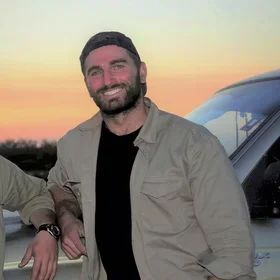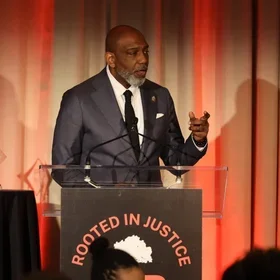This past January, Catherine Rogers (’15SPS, Narrative Medicine), current lecturer in the M.S. in Narrative Medicine and co-director of Columbia's Narrative Medicine International, was awarded her third Fulbright grant. Rogers used the 2024 Fulbright Specialist grant to travel to Malaysia and establish a narrative medicine program at Universiti Hospital Malaya Faculty of Medicine in Kuala Lumpur. She was joined by and collaborated on the Malaysian residency with Dr. Leeai Chong, M.D.; Dr. Hui Siu Tan, M.D.; and Deepu Gowda, M.D., director of clinical practice for Columbia Narrative Medicine and assistant dean for medical education and associate professor of clinical science at the Kaiser Permanente Bernard J. Tyson School of Medicine.
Her background in professional playwriting, as a James A. Michener Playwriting Fellow at the University of Texas, Austin (MFA 1993) and acting in films and television shows, including, most recently, HBO’s Gilded Age, informed her narrative medicine instruction. Equipped with this experience, she currently teaches the narrative medicine elective in playwriting to first-year medical students at the Columbia University Vagelos College of Physicians and Surgeons.
“Columbia’s Narrative Medicine program opened the path for me to contribute my years of experience as a playwright and performer toward improving health care and medicine,” Rogers said. “It was a vision come true to launch this first-ever narrative medicine collaboration in Malaysia.”
With the support of the Malaysian American Commission on Educational Exchange (MACEE), the team hosted a two-week residency that included narrative medicine workshops, lectures, small group sessions, curriculum development roundtables, and an online webinar. Rogers brought her narrative medicine instruction expertise to the residency, having previously facilitated similar seminars at Mt. Sinai, Brooklyn Lutheran, and Columbia Presbyterian hospitals and Aristotle University Thessaloniki Schools of English and Medicine.
The Malaysia residency included a two-day intensive Narrative Medicine Workshop training physicians, health-care clinicians, artists, and scholars. Rogers, Gowda, and Chong met with faculty from medicine, literature, and the arts to explore how the practice of narrative medicine could be incorporated into the medical school curriculum at Universiti Malaya.
“I have long believed that when artists work side by side with clinicians in health care and medicine, we all become better at what we do,” Rogers said.
Rogers also led group sessions in narrative medicine at the Universiti Malaya Hospital and School of Medicine and at Hospital Amram, the public hospital in Kuala Lumpur. The residency culminated in an exhibition of participants’ work and an online webinar.
"Catherine’s work is a fantastic example of the many ways that the practice of narrative medicine can enhance health care through collaborations with local communities, organizations, and institutions around the world,” said Mary Sormanti, M.S. in Narrative Medicine program director. “Her commitment to the power of story to enhance the health-care experiences of both providers and recipients makes her a highly regarded ambassador of the field."
Rogers’s previous Fulbright grants brought her to Aristotle University Thessaloniki and the University of Athens Kapodistrian in 2009 and 2013, hosted by Tatiani Rapatzikou, Ph.D., and Evangelia Sakelliou, Ph.D., and supported by Artemis Zenetou, director of the Fulbright Foundation in Greece. Rogers has subsequently been awarded a three-week Specialist grant to the University of Ioannina School of Medicine, Greece, hosted by Theodora Tseligka, Ph.D., to take place in March 2026.
About the Narrative Medicine Program
Columbia University’s Master of Science in Narrative Medicine prepares health professionals, writers, and scholars to apply the skills and values of narrative understanding to improve outcomes for both patients and caregivers. It offers a rigorous and in-depth study of close reading of creative texts, illness and disability narratives, narrative ethics, philosophy, creative writing, and other perspectives.


